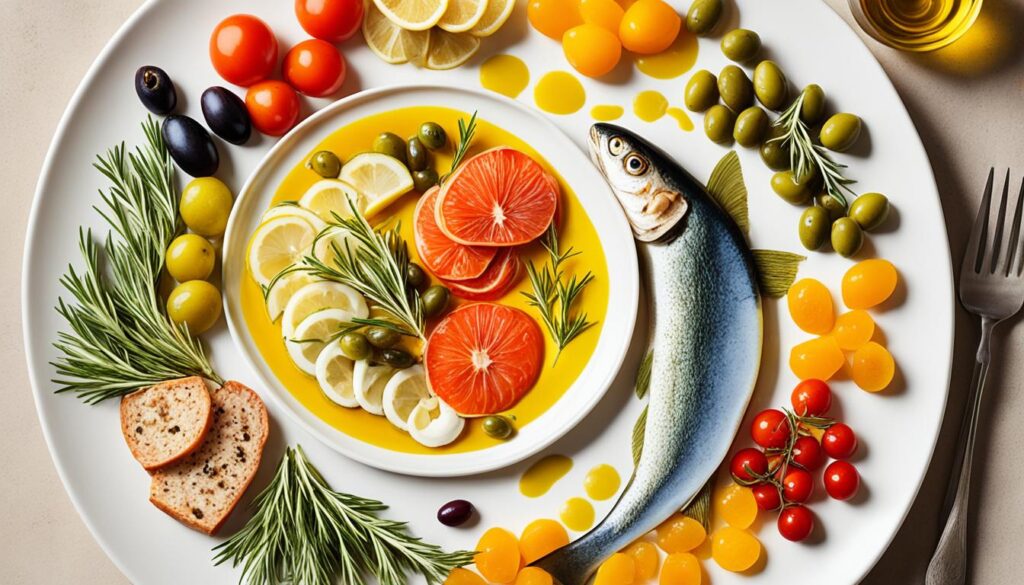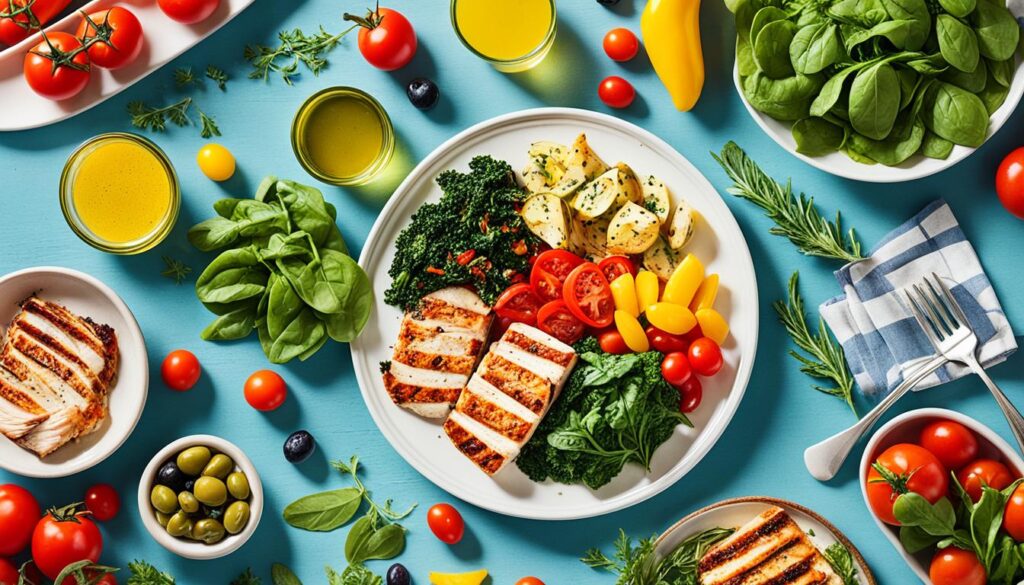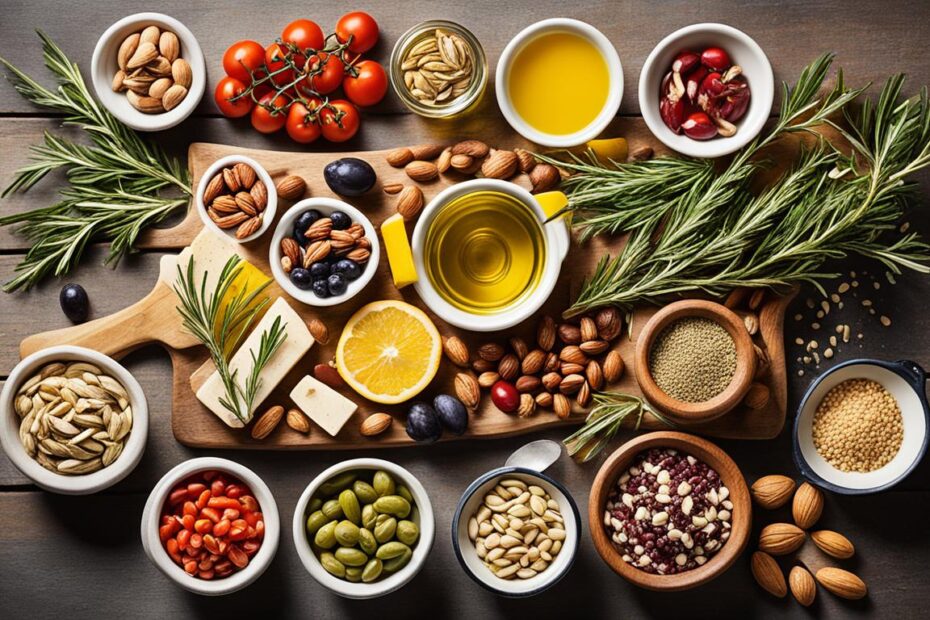I love learning about healthy eating. The Mediterranean diet catches my attention. I want to know what it’s all about and why it’s so famous and good for us.
This diet comes from the region around the Mediterranean Sea. It’s focused on plants like veggies, fruits, and nuts. Olive oil is a big part of it. It also includes some dairy, eggs, poultry, and not much red meat.
The best thing about this diet is it uses fresh, natural foods. Health experts all over recommend it. It’s good for managing weight, keeping the heart healthy, and stopping diabetes. I’m excited to learn more about the foods and habits that make it so great.
Plant-Based Foods: The Foundation
The Mediterranean diet loves plant-based foods. It focuses on a mix of veggies, fruits, grains, and legumes. These foods are the heart of eating this way.
Vegetables, Fruits, Whole Grains, and Legumes
In this diet, you’ll eat plenty of veggies like tomatoes, spinach, and carrots. There are also lots of fruits, including apples and berries. Eating whole grains, such as oats and brown rice, is very important. Legumes, or beans and lentils, are big in the Mediterranean diet too.
Nuts, Seeds, and Olive Oil
This diet includes nuts, seeds, and olive oil. They have good fats that are part of the Mediterranean lifestyle.
By following the Mediterranean diet, you can make your meals more healthy. This can mean eating more veggies, using olive oil, choosing whole grains, or snacking on nuts. It’s a great way to live healthier with a diet rooted in plants.
Healthy Fats: A Key Component
The Mediterranean diet is famous for using healthy fats. These fats are great for our health. They mostly come from plants and some fish.
Unsaturated Fats from Plants and Fish
Olive oil is a big part of the Mediterranean lifestyle. It offers healthy fats and is full of unsaturated fats. These fats help your heart by keeping your cholesterol and inflammation down.
Then, there’s the focus on fish. The diet loves fish like salmon and sardines. They are full of omega-3 fatty acids.
Omega-3 Fatty Acids and Their Benefits
Omega-3s from fish are very good for you. They help lower chances of heart issues and stroke. They do this by making your blood vessels work better and your blood fats lower.

Eating lots of Mediterranean fats from both plants and fish is what the diet is about. It keeps our hearts in tip-top shape.
Moderate Portions of Lean Proteins
The Mediterranean diet likes eating just enough lean proteins. It means food like chicken, eggs, and low-fat cheese. You eat less red meat but enjoy seafood, especially fish like salmon. This way, you get the protein you need without too much bad fat that might hurt your heart.
Research shows a serving of salmon with omega-3 has 22 grams of protein. If you choose garbanzo beans, you still get 7 grams of protein. There are also other good proteins in the Mediterranean diet. For example, you have:
- Almonds, offering about 7 grams of protein in a 1/4-cup
- Quinoa, giving nearly 8 grams of protein per 1-cup
- Whole-wheat pasta, with some 7 grams of protein in 1-cup
- Broccoli and Brussels sprouts, each giving about 4 grams of protein in 1-cup
Eating these proteins the Mediterranean way helps you meet protein needs. You also light on saturated fats. This is key to staying healthy and feeling good.
What Mediterranean Diet Consists Of
The Mediterranean diet is about adding good foods to your meals. You eat lots of plants, some meat, and good fats. You’ll mainly use olive oil for cooking. This way of eating helps you stay healthy.
This diet is often ranked as a top choice. It can help your heart, brain, and keep a healthy weight. Now, let’s talk more about its main points.
Mediterranean Diet Structure and Guidelines
The Mediterranean diet structure focuses on these tips:
- Love plant-based foods like veggies, fruits, and nuts
- Choose olive oil as the main fat in your meals
- Eat some dairy, chicken, and eggs
- Don’t have too much red meat
- Eat fish and seafood often
- Sharing meals with loved ones is good for you
- Stay active as a part of a healthy life
This diet’s plan is very flexible. You can mix in foods you like based on where you’re from. What matters is eating food that’s good for you and not much that’s not so good for you.

Choosing the Mediterranean way helps you have lots of tasty and healthy food. It grows your health and happiness.
Limited Processed and Red Meats
In the Mediterranean diet, it’s good to eat less processed and red meats. These types of meats can make heart disease more likely. Eat plant-based proteins and lean meats like poultry and seafood instead.
Eating less processed and red meats is a smart move for health. It means you’re picking better proteins. This choice can really improve your diet and make you feel better.
Processed Meats: A Cautionary Tale
Things like bacon, sausages, and deli meats can be bad for you. They’re full of salt, preservatives, and unhealthy fats. These can lead to heart problems and some cancers. The Mediterranean diet says to eat more plant-based proteins or healthier meat options.
Minimizing Red Meat Intake
Beef, pork, and lamb are okay sometimes but not every day. Eating too much can hurt your heart and make cholesterol high. The Mediterranean diet advises picking lean red meats. Use them in small amounts in your meals.
- Swap processed and red meats for plant-based proteins like legumes, nuts, and seeds.
- Pick lean, unprocessed red meats and eat them moderately.
- Try other healthy meats like poultry and seafood. They’re great in the Mediterranean diet.
Eating less processed and red meats, and more plant proteins and lean meats is key. It’s how you fit the Mediterranean diet model. You’ll get lots of good health results this way.
Herbs and Spices for Flavor
The Mediterranean diet uses lots of herbs and spices to make food tasty and healthy. They don’t add too much salt. Instead, they use herbs and spices that are full of flavor and good for you.
Replacing Salt with Herbs and Spices
The Mediterranean diet is all about eating less salt but still enjoying your food. With herbs and spices, you can make your dishes tasty without too much salt. Some favorites include mediterranean diet herbs and mediterranean diet spices:
- Garlic: Adds depth and savory notes to a wide range of dishes.
- Basil: Provides a fresh, aromatic presence in tomato-based sauces and pesto.
- Rosemary: Lends an earthy, pine-like flavor that pairs beautifully with meats and potatoes.
- Cinnamon: Brings a warm, sweet spice that complements both sweet and savory preparations.
Using these boosts the flavor of your food while keeping salt low. This way of cooking is yummy and good for your heart. The mediterranean diet flavor makes meals both delicious and nutritious.
Red Wine in Moderation
Red wine is a part of the famous Mediterranean diet. It is enjoyed with meals in moderation. This diet advises women to have one glass a day. Men can have up to two.
Studies look at the benefits of drinking red wine in moderation. They say the antioxidants, like resveratrol, are good for the heart. They help keep blood pressure and cholesterol healthy. Red wine’s anti-inflammatory powers also fight off some chronic diseases.
But, be careful with how much wine you drink. It’s wise to talk to your doctor first. They can help you decide what’s best for you. Remember, taking it slow with red wine is the best approach.
So, keep a balance when including red wine in your diet. This way, you might get the diet’s health benefits. The Mediterranean way is more than food. It’s a healthful lifestyle that many choose to follow.
Lifestyle Factors: Shared Meals and Exercise
The Mediterranean diet is more than just a way of eating. It’s a whole lifestyle with social and physical parts. Traditional Mediterranean culture loves shared meals with loved ones. Eating together and enjoying tasty, plant-based meals is key.
This way of life also includes being active. People regularly walk, swim, or do other exercises. These actions, combined with eating fresh foods, bring many health benefits. This approach makes life healthier and more fun.
Living the Mediterranean lifestyle means enjoying both social and physical activities. It’s not only about what we eat. It’s about celebrating good food, sharing moments, and staying active.
